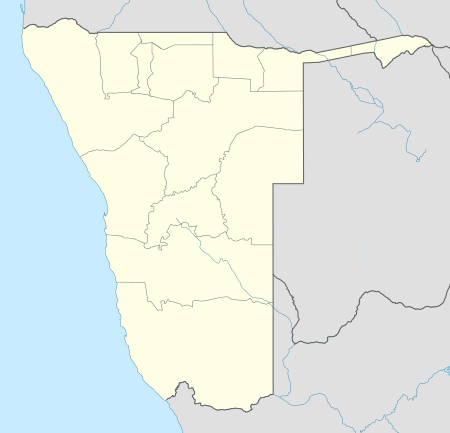Odibo
| Odibo | |
|---|---|
| Village | |
 Odibo Location in Namibia | |
| Coordinates: 17°24′S 15°57′E / 17.400°S 15.950°E | |
| Country |
|
| Region | Ohangwena Region |
| Constituency | Oshikango Constituency |
| Government | |
| • Headman | Charles Namoloh |
| Time zone | South African Standard Time (UTC+1) |
Odibo is a village in the north of Namibia close to the Angolan border known for its Anglican mission St Mary. It belongs to the Oshikango electoral constituency in the Ohangwena Region. Odibo is also an Archdeaconry in the Diocese of Namibia.[1]
Odibo is situated on top of a large underground water reservoir. Cracks in the soil and in stone structures are attributed to this. The village Headman is Charles Namoloh, Namibia's Minister of Regional and Local Government, Housing and Rural Development.[2]
History
St Mary's Mission in Odibo was established in August 1924 by George Tobias, Nelson Fogarty, and Reverend R White, Anglican priest that had the task of setting up a mission in northern Ovamboland.[3] The tree where they camped before starting their work is today known as Tobias' Tree.[3] The mission eventually comprised a church, a hospital, and the St Mary Mission School, a high school and seminary.
St Mary Mission School operated until 1979 when it was closed by the South African colonial administration.[4] Several notable people attended this school, including human rights activist and Bishop James Kauluma,[5] National Council member Michael Hishikushitja,[6] People's Liberation Army of Namibia (PLAN) commander Peter Mweshihange,[7] National Assembly member and Bishop of Ovamboland Peter Kalangula[8] and Minister of Foreign Affairs Netumbo Nandi-Ndaitwah.[9]
During the Namibian War of Independence the seminary was bombed in 1981 by the South African Defence Force.[10]
Education
There are two schools at the village, St. Mary's Odibo High School, the successor of Saint Mary Mission School, and Odibo Combined School.[11] There is also a Lutheran Centre for Arts and Crafts for artistic subjects, established by one of Namibia's most famous artists,[12] John Muafangejo, in the early 1970s.[13]
People
Sons and daughters of the village include:
- Hidipo Hamutenya, opposition leader[14]
- Charles Namoloh, Minister of Regional and Local Government, Housing and Rural Development[15]
References
- ↑ "Archdeaconry of Odibo". Anglican Church of Southern Africa. Retrieved 8 January 2014.
- ↑ Shivute, Oswald (8 January 2014). "Land cracks shock Odibo villagers". The Namibian. p. 3.
- 1 2 "Inventory: AB934 – George Wolfe Robert Tobias Papers 1882–1970". University of the Witwatersrand. Retrieved 9 January 2014.
- ↑ Shiremo, Shampapi (4 November 2011). "Michael Hishikushitja: An effective and eloquent Parliamentarian of the National Council (1953–2001)". New Era. Archived from the original on 27 May 2012.
- ↑ James Kauluma: A warrior for justice (1933 to 2007) New Era, 12 February 2010
- ↑ Shiremo, Shampapi (4 November 2011). "Michael Hishikushitja: An effective and eloquent Parliamentarian of the National Council (1953–2001)". New Era. Archived from the original on 27 May 2012.
- ↑ Sasman, Catherine (2 October 2009). "Peter Mweshihange: Man of all seasons (1931 to 1998)". New Era. Archived from the original on 31 March 2012.
- ↑ "Laaste eer by Kalangula se graf" [Last Honour at Kalangula's Grave]. Die Republikein. 3 March 2008.
- ↑ Hopwood, Graham. "Who's Who, entry for Netumbo Nandi-Ndaitwah". Namibia Institute for Democracy. Retrieved 8 January 2014.
- ↑ Hovey, Gail (1982). Namibia's stolen wealth (PDF). The Africa Fund. p. 13.
- ↑ "Ohangwena Schools". Association of Regional Councils in the Republic of Namibia. Retrieved 8 January 2014.
- ↑ Clewing, Ulrich. "Uneasy memories". culturebase.net. Retrieved 8 January 2014.
- ↑ "John Ndevasia Muafangejo (1943–1987)". lifewithart.com. Retrieved 8 January 2014.
- ↑ Hopwood, Graham. "Who's Who, entry for Hamutenya, Hidipo – Swapo". Guide to Namibian Politics. Namibia Institute of Democracy (NID). Archived from the original on 27 December 2013. Retrieved 8 January 2014.
- ↑ Hopwood, Graham. Guide to Namibian Politics, 2007 edition. Namibia Institute for Democracy, Windhoek, 2007